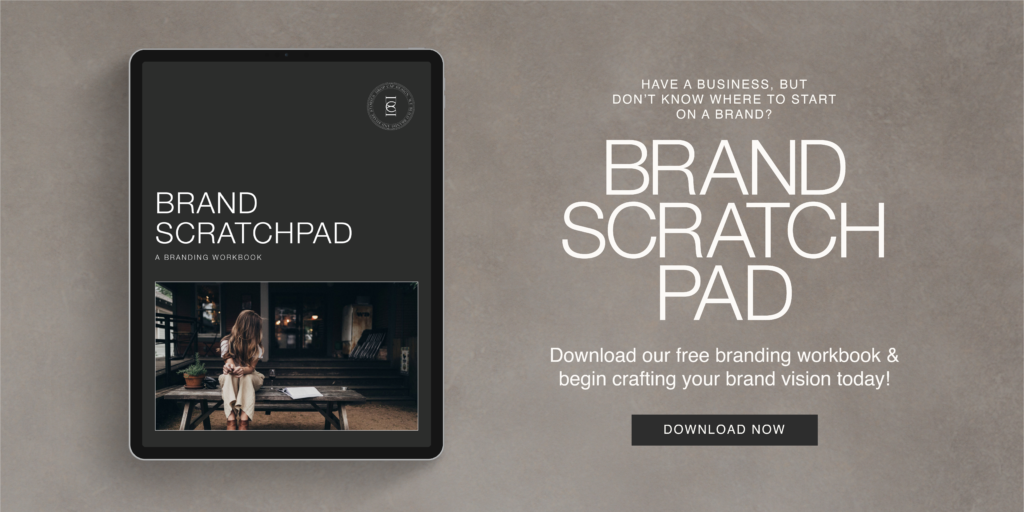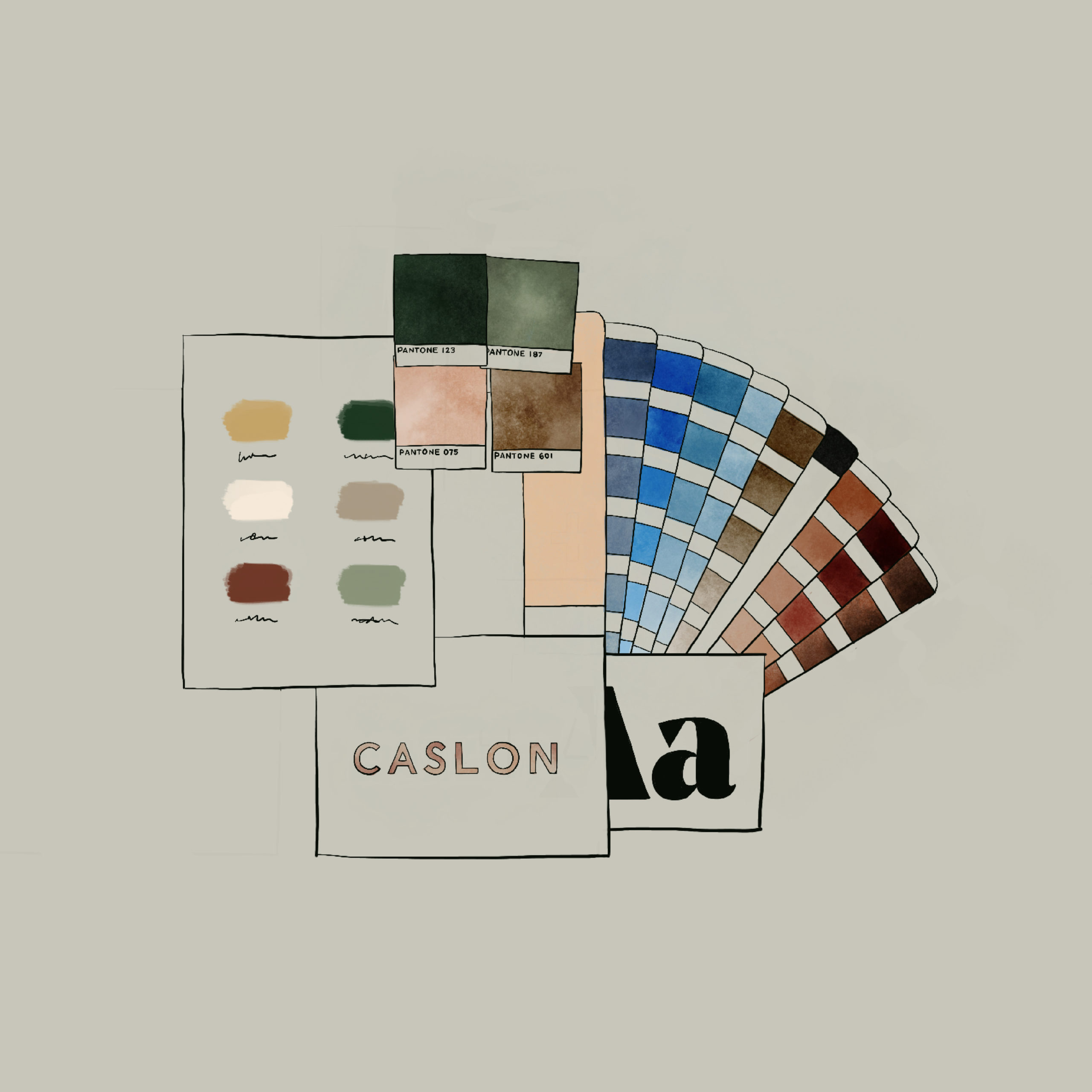In the age of digital promotion, it can look so easy to follow the path of entrepreneurship. You see countless young creatives traveling the world, working with exciting clients, publishing books, and starting podcasts. In a quick Pinterest search, dozens of blog posts ranging from “Zero to Six-Figures” and “My Handmade Six Figure Business” scream for attention.
With this new wave of DIY digital entrepreneurship, it appears that the glass ceiling of CEOs has been permanently shattered. Anyone can start a financially successful business with just a home studio and the Adobe Creative suite…. or can they?
I’m in the unique position as a brand designer working with people who are starting businesses every day. This year alone, we have worked with nearly fifty individual brands to launch new ideas.
Through my own experience, and the process I have watched our clients go through, there seems to be a few essential ingredients for successful businesses. Building a strong foundation will allow your idea to flourish to its greatest potential. It can be so tempting to quit your depressing job, start immediately, and trust the success that others have experienced. But, dear friend, please know what you’re getting yourself into.
And then by all means jump in!
7 Things to Consider Before Becoming the Boss
Purpose
It can come in many different forms – your why, your mission, your core values. But what it boils down to is that you need a reason to start a business besides hating your current job. Starting a business will require more from you mentally, emotionally, and financially than being an employee ever will. You need to be really clear up front as to why you want to do this.
At this point, it doesn’t have to be a clear idea of WHAT exactly you want to do or produce, just why. Why entrepreneurship? Be really honest about how you think your life will improve as a result. This is not necessarily a question where you fill in “selfless world peace.” Unless, of course, that’s your core reason.
Something like – “to be in control of the environment I’m in every day,” “to be able to travel across the country to visit my family more often,” “to be able to learn and practice a different skill set than I’m able to find in an employed job,” or even something as simple as “to build self-confidence through the act of starting a business.” Defining your purpose can also shed a lot of light on whether an idea is a true business venture or better as a personal project.
This doesn’t have to be ground break – just honest. The reason why it’s so important is that your purpose will dictate how you define success and make decisions as your business grows. It’s a great idea to have both a personal purpose and a business purpose if you plan on working with a team in order to align when things get crazy. Because they will.
I used to think that defining your purpose was a fancy way of positioning your brand in a marketplace. And honestly, it’s a great way to incorporate your purpose into your marketing copy as a way to attract the right people. But here’s why you don’t START there:
Your purpose absolutely has to resonate with you FIRST. Even if it’s not fancy and glossy and well written. It needs to be powerfully personal. The purpose of your purpose (ha ha) is to immediately snap you out of the hustle and put things in perspective. See why it’s so important to define it with YOURSELF in mind, and NOT your customers? It’s going to help you when you need to say “no” to a customer in order to stay true to your purpose and even say “no” to sparkly opportunities that compromise your original intentions.
Finances
This is probably the obvious next step before purchasing the domain and setting up shop. Can you afford to start a business right now? A key thing to pay attention to here is timing. Are the stars lining up in order for this opportunity to be possible – are you experiencing support and encouragement from the people who know you best, do you have a financial cushion in case you experience a slow start, do you have a few initial clients/customers lined up?
You need to be honest – really honest – about what you need to make each month to at least be able to spend one full year trying to get your business off the ground. Even if you’re not a numbers person, you need to ask for help to know your numbers. How much do you spend currently every month? Do you have any upcoming financial commitments? Take a good look at the full year ahead and map out your finances.
Then, research what you’ll need to start your business – tools, software, programs, resources, help. Be diligent and exhaustive in your research here. Ask people who are doing something similar to you to see what they use. Take an inventory of what you have and what you need. You don’t want this to come as a surprise once you start.
This information is going to be so helpful when you’re creating your prices. It will be amazing in establishing boundaries with “trade” or collaborative work. You’ll know what you need so that you don’t fall victim to desperate decision making.
Personality
Do NOT skip this step. It’s so often forgotten and makes a HUGE difference in transitioning from employment to entrepreneurship.
It’s not just a matter of having the personality to handle what entrepreneurship will demand from you. It’s knowing your unique character in order to know what you need from your situation instead of forcing your personality into a pre-established role. To be clear, you’ll learn more about yourself and discovery or even change components of your personality over the course of your business. This isn’t set in stone – but it will set you up for success in the first few years and give you a running start in building the correct business model.
I’ve taken a plethora of personality tests – Myers Briggs and Strength Finders in particular. There are so many ways you can discover your personality, but here are a few key things to discover before making the leap:
- Are you energized/inspired when you have space by yourself or when you are around other people? Knowing this will help in establishing the right environment to work on your business.
- Are you naturally self-disciplined or do you need deadlines and accountability to finish what you start? Knowing this will help to decide if a project management tool or business coach is an important initial investment in your business.
- How are you in conflict? Do you retreat, fight back, or are you a peacemaker? Knowing this will help you create boundaries in your communication to handle conflict with diplomacy.
This is just the start of how your natural preferences will impact your business. I encourage you to be continuously exploring the nuances of your personality in order to create situations in which you effortlessly shine. Running a business is hard enough – knowing what you need to succeed makes the road a little less rocky.
Lifestyle
Now it’s time to dream. When you picture your entrepreneurial self – what does your day look like? Are you racing from meeting to meeting with your dream clients? Are you working from your perfect little corner of the world undistracted? Are you sitting at a table among your best creative friends and brainstorming big ideas?
Being clear about what you want your life to look like is the first step in making it happen. Don’t fall victim to the trap of too many possibilities – you only want the ones that are best and most exciting to YOU.
Think about marketing – do you enjoy writing, talking on the phone, talking on camera, taking pictures, or participating in conversations? These will help you determine which platforms would be best for your business. Remember you can do anything, but not everything.
Think about your process – do you know you enjoy collaboration and quick deadlines alongside your clients? Do you like to get away and create by yourself and then come back to show what you’ve made? Do you like flexibility in your schedule to work when you feel most inspired or prefer structure in your schedule to know when your day starts and stops?
Thinking about clients versus customers – do you like working on custom projects or creating products to sell? Do you enjoy working with lots of clients at the same time or focusing only on one at a time? Do you like stepping in and doing one portion of a project or overhauling the entire thing? Is it an ongoing relationship or a one-time deal? How often do you want to check in and communicate? Do you want to pull anyone into the process to bear the responsibility? Do you want to talk to customers directly or no?
When you’re just starting out, some of your desires will not be possible yet. But defining what your dream lifestyle would look like will help you to see pivotal steps when they arise, and most importantly, to say “no” to roadblocks disguised as opportunities. It’s also a great practice to help you work through some of the kinks in your business idea. If you’re desiring a creative retreat, but in your mind, you’re envisioning a perfectly designed home, you may need to switch some initial ideas around. Consider a virtual retreat instead. This will allow you to plan and host straight from your home studio.
Lifestyle design is one of the most amazing rewards of entrepreneurship, but also where a lot of small business owners struggle. It can be easy to look at what the competition is doing and forget that when you’re the boss, you get to make the rules. There’s no such thing as right or wrong!
Environment
Once you’ve decided where you work best – in a coworking studio with others, in an independent storefront or studio with a small team, or independently in your home office – it’s time to set up that space for inspiration.
In your first year of business, you’ll be putting in more hours than you initially planned for. You’ll spend quite a few restless nights struggling with the transition and ideas and frustration that it isn’t happening fast enough. Your business will frustrate you and challenge you to push harder than you’ve ever had to before.
So I encourage you to invest in the space where you’ll be mentally working through these problems and transitions. Without going crazy – how can you design or decorate your workspace to make the long hours worth it? Do you like listening to music while you work? Set up a speaker! Do you have a library of books you purchased while researching your idea? Display them for quick and easy reference! Do you plan to invite clients to visit your space during the project? Make it comfortable and inviting!
If you’ve decided that you’re a coffee shop hopper, then invest in tools that are easy to transport and a bag that will save your shoulders. Make the process of setting up and working as enjoyable and fun as possible.
And lastly – who will be your support group? Do you prefer going to an online community or meeting in person? Are you a conference attendee or a course taker? Would you attend local events in your industry or do you enjoy meeting new people one on one? Definitely, have a support plan in place as you navigate your first year – people who are doing similar things and working with a similar market or industry. Then make it a priority to invest in that community!
Vision
Now is the time to dream and plan your product or service.
For service based businesses, go ahead and research who else is doing something similar to you. Make notes about what you like/don’t like about your competitor’s business models. What is their process like? What are the final deliverables? Are there packages or custom quotes? What’s the turnaround? How many people are on their team?
Begin to map out your own service. Take what you like and leave the rest. Creatively come up with your own offering that matches YOUR personality and breaks the mold. Consider reaching out to a few competitors to ask questions or see if they will offer any insight or advice behind why they’ve made certain decisions. Begin to build relationships with your competitors so that they may refer people to you as you’re starting out. There’s no need for building walls with those you may compete with for business. There’s enough work to go around!
If you’re a product-based business, start doing research about what you want your product to be like. What else is on the market? What do you want to be special or unique about your offer? Is it physical or digital? In a shop or e-commerce? Start taking notes about what you want that experience to be like. How will they use your product and what will the purchasing experience be like?
Along the way, you’ll also be able to add to your financial plan as you become aware of what you’ll need to get started.
Market
Before launching your business, you need to really consider and dream about your future clients and customers. Where are they located? Why are they coming to you? How will you be a breath of fresh air? What kinds of interactions are you most excited about having with your customers? What would a dream testimonial look like?
Have you tested this customer base with a small product or project? Have you participated in any strategic collaborations with people who may be clients later? Have you reached out to see what your customers really want? Read reviews? Asked them how their experience was with someone else?
Make a list of the profitability of your service or product. How much of a priority is it to your potential customer – a nice-to-have or a total necessity? Are they in an urgent/desperate situation or able to be on a waitlist? Do they value confidentiality and privacy or welcome the community of the rest of your client base?
Starting a business isn’t as hard as it used to be. Starting the RIGHT business is.
Before you launch your new idea into the world, take the time to do it the right way from the beginning. Do a lot of soul searching and exploration. Ask for help and advice. Consider all the outcomes. You’ll be so grateful that you did when 10 months down the road you’ve built a business that perfectly aligns with your dreams and goals.
I’ve created a workbook below to brainstorm all the things your brand could be!





This is such an invaluable and informative post! It’s really cleared up a lot of ideas I had about starting a business. Thank you for putting this together x
Oh, I’m so glad you found it useful! Honestly, I wish more people talked about it. Entrepreneurship is not the only way to find freedom in your work!!
Agree with Maria, thanks boss!
Oh, I’m so glad you liked it!!
Really great post – still reading but wanted to say thanks for writing and sharing your experiences and advice, good stuff, totally agree with everything I have read so far! // chrisdavidg.com
I’m so glad! Yeah I’ve learned a lot of lessons along the way. I’m glad you enjoyed it!
This is sooooo helpful and puts in the writing the questions we really need to ask ourselves not just once but often. Thanks Kadie for this post and for the worksheets! 👏
Oh this makes me so happy!! So glad you enjoyed it!